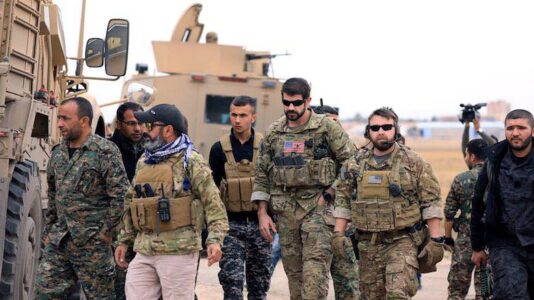
Three rockets target US army troops near oil field in Syria
Three rockets were fired on positions near US troops in Deir al-Zor on Tuesday, according to an official from the Defeat-ISIS Coalition, just one day after American and Syrian government forces briefly exchanged fire.
“On August 18, three small Kaytusha rockets impacted near Conoco base, Syria,” Coalition Spokesperson Col. Myles Caggins told Kurdistan 24. “No Coalition casualties or damage.”
He confirmed that the rockets were fired from west side of main road near Conoco, outside of the Coalition’s “Eastern Syria Security Area,” which includes areas under the control of the Syrian Democratic Forces (SDF) in Deir al-Zor and Hasakah provinces, where the Coalition maintains a presence.
The east bank of the Euphrates River is controlled by the SDF while the west bank is controlled by the Syrian government and its allies.
The media center of the SDF-affiliated Deir al-Zor Military Council wrote in a social media post quoted a Coalition source saying that the attack impacts “operations of the Coalition and its allies the SDF against ISIS in the area.”
“This is not the first time that the SDF forces have been exposed to fire from the (regime) side, opposite of the river,” it added.
On Jan. 5, three shells were fired at the Coco gas field in Deir al-Zor from areas under the regime’s control.
On Monday, gunfire was exchanged between the Syrian regime and US forces.
The Coalition said that a US patrol returned fire in self-defense after attempting to pass a regime checkpoint in a village south of Qamishlo, resulting in casualties among regime soldiers.
Last October, following a telephone conversation between US President Donald Trump and Turkish President Recep Tayyip Erdogan, Turkey launched an offensive into areas of northern Syria under SDF control. Trump had hoped that Turkey would maintain security there and allow him to withdraw US troops.
However, Trump’s decision was widely criticized, including within his own political base. The White House then soon reversed, in part, that decision, agreeing to leave some 500 US troops in Syria to protect oilfields in the provinces of Hasakah and Deir al-Zor.
The Syrian regime, Iran, Turkey, and the Russian government oppose the continued US troop presence in northeastern Syria.
Last year, Syrian president Bashar al-Assad claimed to have formed tribal resistance forces against the US presence in the country.
Russia recently accused the United States of “illegally trading” in Syria’s oil resources, in response to media reports in late July that local Kurdish-led forces in northeastern had Syria made an agreement with an American company to modernize oilfields there.
After the news of the deal, tensions increased between the Syrian regime and SDF forces in Syria.
One senior tribal leader, Sheikh Muttshar al-Hifil, was assassinated by unidentified gunmen on Aug. 2 in Deir al-Zor which led to unrest in the area. Previously, other tribal members were also killed in similar circumstances.
Following the assassination of al-Hifil, pro-regime figures such as National Defense Forces (NDF) commander Firas Jeham threatened SDF forces and others who work with the “US occupation.”
The pro-SDF news agency Hawar News published two confessions of alleged regime cell members this month and suggested that Damascus was behind the assassinations of tribal leaders.
Unknown sleeper cells also targeted the SDF during the unrest this month in Deir al-Zor, resulting in the Aug. 6 death of Shaaban al-Ma’t, the group’s commander of the Bukamal regiment.
“Iran and Assad cells have been greatly active in Deir Ezzor (Deir al-Zor) in the past few months, and are working to sow sedition between the Arab and Kurdish components,” Omar Abu Layla, the executive director of the news agency Deir ez Zor 24, told Kurdistan 24.
He concluded, “Assad’s forces and Iran’s militias have failed to fuel the situation east of the Euphrates for weeks, and are now trying again to do some stupid actions by provoking the coalition, whose response was so fast and direct last time in Hasakah’s countryside.”
Source: Kurdistan 24





